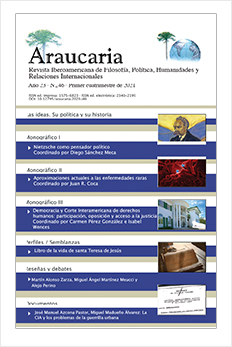El gobierno en tiempos tempestuosos. Escenas de la democracia ateniense y su relación con la crisis
DOI:
https://doi.org/10.12795/araucaria.2021.i46.04Palabras clave:
democracia, aristocracia, crisis, conflictoResumen
El presente trabajo está orientado al análisis de la relación entre democracia y crisis prestando atención a los antecedentes ajenos al contexto griego y el desarrollo del caso ateniense. Sobre esa base, se revisan dos tipos de fricción con otros modelos políticos. Por un lado, los elementos de tensión con la aristocracia, a través del testimonio de Tucídides y del Viejo Oligarca, y con los gobiernos unipersonales, a través del Hierón de Jenofonte, a los efectos de evaluar el papel de la relación con la crisis en su perfil general.
Descargas
Citas
Referencias
Bos, A. (1984). Aristotle’s Eudemus and Protrepticus: Are they really two different works? Dionysius, 8.
Bos, A. (2003). The Soul and its Instrumental Body: a reinterpretation of Aristotle’s philosophy of living nature. Leiden: Brill.
Cawkwell, G. (1995). “Early Greek tyranny and the People”. Classical Quarterly, 45.1.
Chantraine, P. (1968). Dictionnaire étymologique de la langue grecque. Histoire des mots. Paris: Klincksieck.
Cherniss, H. (1953). “The History of Ideas and Ancient Greek Philosophy”, Studies in Intellectual History. Boston: Johns Hopkins Press.
Derderian, K. (2001). Leaving words to remember: Greek mourning and the advent of literacy. Leiden: Brill.
Glassman, R. (2017). The Origins of Democracy in Tribes, City-States and Nation-States. Dordrecht: Springer.
Gottwald, N. (2001). The politics of ancient Israel. Louisville: Westminster John Knox Press.
Isakhan, B. (2007). "Engaging" primitive democracy": Mideast roots of collective governance". Middle East Policy 14.3.
Jacobsen, T. (1943). "Primitive democracy in ancient Mesopotamia". Journal of Near Eastern Studies 2.3, 159-172.
Loureaux, N. (1986). The invention of Athens: The funeral oration in the Classical City. Cambridge, CUP.
Marr, J. y Rhodes, P. (2008) The Old Oligarch, The Constitution of the Athenians attributed to Xenophon, London: Oxbow.
Mársico, C. (2011). “Ejes para pensar lo griego”. En: C. Mársico (Ed.), Polythryleta. Sistemas explicativos y mutación conceptual en la antigua Grecia, Buenos Aires: Rhesis.
Mársico, C., Illarraga, R. y Marzocca, P. (2017). Jenofonte, Constitución de los espartanos y Hierón; Pseudo-Jenofonte, Constitución de los atenienses. Buenos Aires: UNQui.
Martin, M., Snell, D. (2005). “Democracy and freedom”. En: D. Snell (Ed.), A Companion to the Ancient Near East, Oxford: Blackwell.
Mattingly, H. (1997). “The Date and Purpose of the Pseudo-Xenophon Constitution of Athens”. Classical Quarterly, 47.2.
McGlew, J. (1993). Tyranny and Political Culture in Ancient Greece. London: Cornell University Press.
Moreno Pestaña, J. (2013). “Isegoría y parresia: Foucault lector de Ión”. Isegoría, 49.
Parker, V. (1998). “Túrannos. The semantics of a political concept from Archilochus to Aristotle”. Hermes, 126.
Perrin, B. (1904). "The Rehabilitation of Theramenes". The American Historical Review 9.4.
Pesely, G. (1988). "Socrates' Attempt to Save Theramenes". The Ancient History Bulletin 2.
Plácido, D. (2006). "Vencedores y esclavos: Las Troyanas de Eurípides". Koinòs lógos. Homenaje al profesor José García López, Murcia.
Rodríguez Guerra, R. (2011). “Las reformas de Clístenes: cuándo, cómo y por qué. En torno a los orígenes de la democracia”. Laguna: Revista de Filosofía 29, 149-168.
Rossetti, L. (1975). “Alla ricerca dei logoi sokratikoi perduti (I-III)”. Rivista di Studi Classici [Torino], XXII-III, 102.
Schemeil, Y. (2000). "Democracy before democracy?". International Political Science Review 21.2: 99-120.
Stockwell, S. (2011). "Before Athens: Early popular government in phoenicia and Greek city-states", The Secret History of Democracy. London: Palgrave Macmillan.
Szakolczai, A. (2013). Comedy and the Public Sphere: The Re-birth of Theatre as Comedy and the Genealogy of the Modern Public Arena. London: Routledge.
Terrel, J. (2010). Politiques de Foucault. Paris: PUF.
Van De Mieroop, M. (2013). "Democracy and the Rule of Law, the Assembly and the First Law Code". The Sumerian World, 277-89.
Vilanou, C. (2006). "Historia conceptual e historia intelectual". Ars Brevis 12, 165-190.
Wolf, C. (1947). "Traces of primitive democracy in ancient Israel". Journal of Near Eastern Studies 6.2, 98-108.
Descargas
Publicado
Cómo citar
Número
Sección
Licencia
Las ediciones impresa y electrónica de esta Revista son editadas por el Secretariado de Publicaciones de la Universidad de Sevilla, siendo necesario citar la procedencia en cualquier reproducción parcial o total.Salvo indicación contraria, todos los contenidos de la edición electrónica se distribuyen bajo una licencia de uso y distribución “Creative Commons Atribución-NoComercial-SinDerivar 4.0 Internacional”








